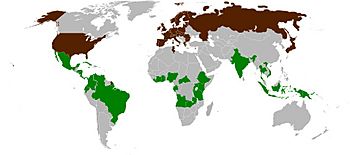International Coffee Organization facts for kids
Quick facts for kids
International Coffee
Organization Organización Internacional del Café (Spanish)
Organização Internacional do Café (Portuguese) Organisation Internationale du Café (French) |
|
|---|---|

ICO exporting members ICO importing members
|
|
| Headquarters | London, WC1 United Kingdom |
| Official languages | |
| Type | Trade bloc |
| Members |
Exporting
|
| Leaders | |
|
• Executive director
|
|
| Establishment | 1963 |
| Currency | Indexed as USD-per-lb |
The International Coffee Organization (ICO) was set up in 1963 in London, under the auspices of the United Nations (UN) due to the economic importance of coffee. It administers the International Coffee Agreement (ICA), an important instrument for development cooperation.
It was a result of the five-year International Coffee Agreement signed in 1962 at the UN in New York City and renegotiated in 1968, 1976, 1983, 1994 and 2007 at the ICO in London.
The International Coffee Council is the highest authority of the Organization and is composed of representatives of each Member Government. It meets in March and September to discuss coffee matters, approve strategic documents and consider the recommendations of advisory bodies and committees.
The ICO's headquarters is located at 222 Gray's Inn Road in London and its current executive director is the Brazilian Vanúsia Nogueira.
The United States officially withdrew from the International Coffee Agreement in June 2018. As of February 2, 2022 ICO Member Governments represent 93% of world coffee production and 63% of world consumption.
Membership
As 2 February 2022, its membership comprises 42 producing members and 7 importing members.
- Exporting Member Countries
 Angola
Angola Bolivia
Bolivia Brazil
Brazil Burundi
Burundi Cameroon
Cameroon Central African Republic
Central African Republic Colombia
Colombia Costa Rica
Costa Rica Côte d'Ivoire
Côte d'Ivoire Cuba
Cuba Democratic Republic of the Congo
Democratic Republic of the Congo Ecuador
Ecuador El Salvador
El Salvador Ethiopia
Ethiopia Gabon
Gabon Ghana
Ghana Honduras
Honduras India
India Indonesia
Indonesia Kenya
Kenya Liberia
Liberia Madagascar
Madagascar Malawi
Malawi Mexico
Mexico Nepal
Nepal Nicaragua
Nicaragua Nigeria
Nigeria Panama
Panama Papua New Guinea
Papua New Guinea Peru
Peru Philippines
Philippines Rwanda
Rwanda Sierra Leone
Sierra Leone Tanzania
Tanzania Thailand
Thailand Timor-Leste
Timor-Leste Togo
Togo Venezuela
Venezuela Vietnam
Vietnam Yemen
Yemen Zambia
Zambia Zimbabwe
Zimbabwe
- Importing Member Countries
See also
 In Spanish: Organización Internacional del Café para niños
In Spanish: Organización Internacional del Café para niños
- Economics of coffee


